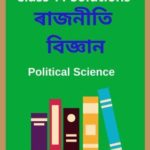Class 11 Political Science MCQ Chapter 15 Rights Solutions to each chapter is provided in the list so that you can easily browse through different chapters Class 11 Political Science MCQ Chapter 15 Rights Notes and select need one. Class 11 Political Science MCQ Chapter 14 Social Justice Question Answers Download PDF. NCERT Political Science MCQ Class 11 Solutions.
Class 11 Political Science MCQ Chapter 15 Rights
Also, you can read the NCERT book online in these sections Solutions by Expert Teachers as per Central Board of Secondary Education (CBSE) Book guidelines. AHSEC Class 11 Political Science Part – I and Part – II MCQ Solutions are part of All Subject Solutions. Here we have given NCERT Class 11 Political Science Multiple Choice Notes, Assam Board Class 11 Political Science Objective Type Solutions for All Chapters, You can practice these here.
Rights
Chapter: 15
| (PART-B) POLITICAL THEORY |
| MCQ |
1. What may be considered necessary for leading a life of dignity?
(a) Right to be creative.
(b) Criminal rights.
(c) Right to livelihood.
(d) Political rights.
Ans: (c) Right to livelihood.
2. Human rights, traditionally are divided into:
(a) Political and economic rights.
(b) Political and social rights on one hand and cultural rights on the other.
(c) Civil and political rights.
(d) Civil and political rights on one hand and the right to development on the.
Ans: (c) Civil and political rights.
3. Freedom of expression is important for:
(a) A state.
(b) A democratic government.
(c) Communist society.
(d) An individual livelihood.
Ans: (b) A democratic government.
4. According to the German philosopher Immanuel Kant, human beings unlike other objects are:
(a) Useful.
(b) Valuable.
(c) Selfish.
(d) Independent.
Ans: (b) Valuable.
5. What is the force behind Legal Rights?
(a) Force of public opinion.
(b) Force of morality.
(c) Force of law.
(d) Force of nature.
Ans: (c) Force of law.
6. The provision to abolish untouchability is reflected in the Indian constitution under.
(a) Article 14
(b) Article 15
(c) Article 16
(d) Article 17
Ans: (d) Article 17
7. A Bill of Rights is enshrined in the.
(a) Philosophers’ diaries.
(b) Constitution of many countries.
(c) Charter of Kings.
(d) Government documents of few countries.
Ans: (b) Constitution of many countries.
8. The political right is the right to:
(a) Shelter.
(b) Sustainable development.
(c) Livelihood.
(d) Form political parties.
Ans: (d) Form political parties.
9. Civil liberties and political rights form the basis of a:
(a) Democratic government.
(b) Monarchical rule.
(c) Totalitarian government.
(d) Dictator rule.
Ans: (a) Democratic government.
10. Right to franchise is a:
(a) Customary rights.
(b) Political right.
(c) Moral rights.
(d) Cultural right.
Ans: (b) Political right.
11. The natural right that was not advocated by the political theorists of 17th and 18th centuries was right to.
(a) Life.
(b) Liberty.
(c) Information.
(d) Property.
Ans: (c) Information.
12. Civil Rights are given to the Individual by:
(a) Nature.
(b) God.
(c) The state.
(d) The people.
Ans: (c) The state.
13. Civil rights are given to the Individual by:
(a) People.
(b) God.
(c) Nature.
(d) The state.
Ans: (d) The state.
14. Natural rights are those which are given to us by:
(a) God of Nature.
(b) King.
(c) Constitution.
(d) Parliament.
Ans: (a) God of Nature.
15. The right to hold public office is a/an:
(a) Moral Right.
(b) Political Right.
(c) Civil Right.
(d) Economic Right.
Ans: (b) Political Right.

Hi! my Name is Parimal Roy. I have completed my Bachelor’s degree in Philosophy (B.A.) from Silapathar General College. Currently, I am working as an HR Manager at Dev Library. It is a website that provides study materials for students from Class 3 to 12, including SCERT and NCERT notes. It also offers resources for BA, B.Com, B.Sc, and Computer Science, along with postgraduate notes. Besides study materials, the website has novels, eBooks, health and finance articles, biographies, quotes, and more.


